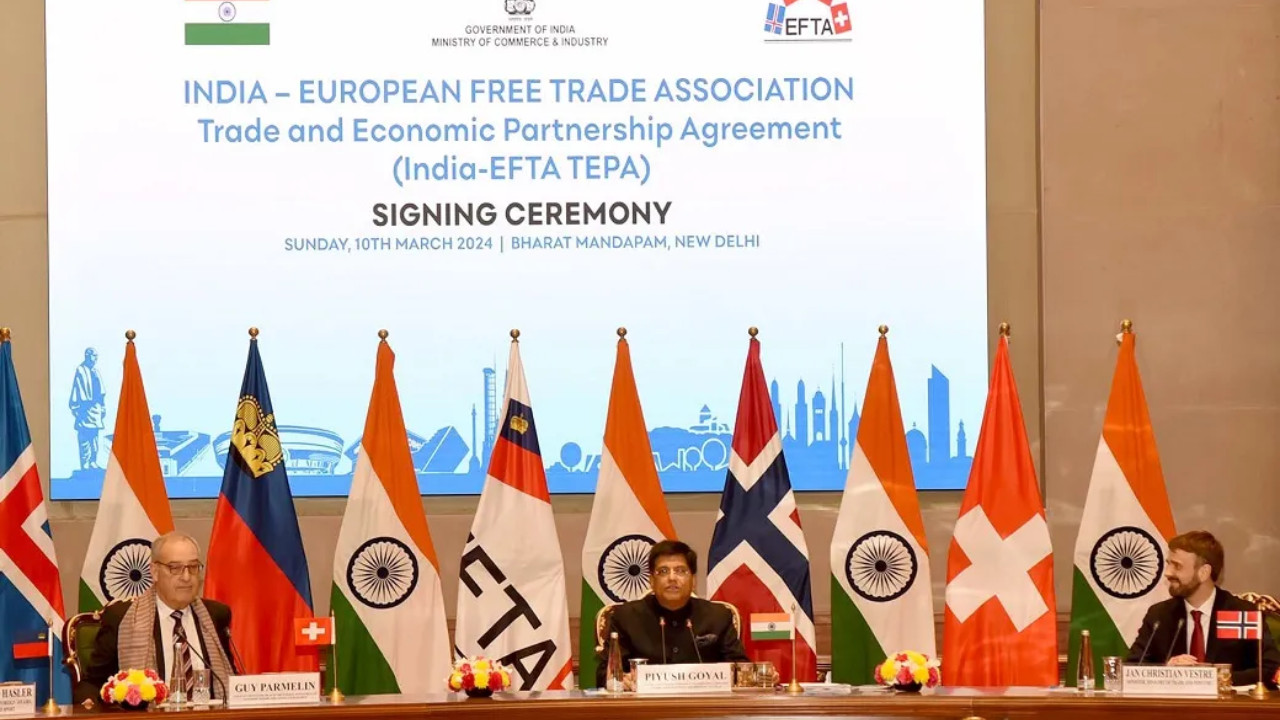India has officially ratified the Trade and Economic Partnership Agreement (TEPA) with the European Free Trade Association (EFTA), submitting the ratification document to Norway. Expected to be implemented by October 1, the agreement anticipates $100 billion in investment from the EFTA bloc over 15 years.
India & EFTA: A New Chapter in Trade Relations Begins
The air crackles with anticipation. Forget the slow churn of bureaucracy; something significant is brewing in India’s trade landscape. India has officially submitted its ratification instrument for the Trade and Economic Partnership Agreement (TEPA) with the European Free Trade Association (EFTA), signaling a green light for the pact to take effect on October 1st. This isn’t just paperwork; it’s a pivotal moment poised to reshape economic ties and unlock substantial investment opportunities.
So, what exactly does this mean for India and its future?
The TEPA with EFTA – comprised of Switzerland, Norway, Iceland, and Liechtenstein – isn’t your run-of-the-mill trade deal. It’s a carefully crafted agreement designed to foster deeper collaboration and mutual growth. It promises significant tariff reductions on a wide range of goods, facilitating smoother and more cost-effective trade between India and the EFTA nations. Imagine Indian textiles, agricultural products, and manufactured goods finding easier access to affluent European markets. The possibilities are extensive.
But the benefits extend far beyond simply cutting tariffs. This agreement is a catalyst for attracting foreign direct investment (FDI) into India. EFTA members have committed to investing a staggering $100 billion in India over the next 15 years. This isn’t pocket change; it’s a substantial injection of capital that can fuel growth across various sectors, from infrastructure and manufacturing to technology and renewable energy.

A Closer Look at the Potential Impacts
What kind of impact are we talking about, realistically? Let’s break it down.
* Boosting Exports: Indian businesses, particularly SMEs, stand to gain immensely from reduced trade barriers. This can translate into increased export volumes, higher revenues, and job creation. The competitive edge gained in the EFTA markets could provide a springboard for further expansion into other regions.
* Attracting Innovation and Technology: EFTA countries are renowned for their technological prowess and innovation. This agreement opens doors for collaborative ventures, technology transfers, and the adoption of best practices in various industries. India can benefit from EFTA’s expertise in areas like sustainable development, renewable energy, and precision engineering.
* Creating Jobs: The influx of investment and increased economic activity are expected to generate significant employment opportunities across various sectors. This is crucial for addressing India’s unemployment challenges and creating a more inclusive economy.
* Strengthening Supply Chains: By diversifying trade partners and reducing reliance on specific regions, the TEPA can strengthen India’s supply chain resilience. This is particularly important in a world increasingly susceptible to geopolitical disruptions and economic uncertainties.
Beyond the Numbers: The Strategic Importance
While the financial figures are undeniably impressive, the TEPA represents more than just a financial transaction. It signifies India’s growing economic influence and its commitment to fostering strong international partnerships. It’s a testament to the country’s proactive approach to trade diplomacy and its determination to integrate more deeply into the global economy.
This move also showcases India’s appeal as an investment destination. The commitment from EFTA countries underscores their confidence in India’s long-term growth potential and its favorable investment climate.
Consider exploring other trade agreements India has recently engaged in. Check out our deep dive into the India-Australia Economic Cooperation and Trade Agreement (ECTA) for a complementary perspective on India’s global trade strategy.
Seizing the Opportunities Ahead
The ratification of the TEPA marks the beginning of a new era in India-EFTA relations. However, the true success of this agreement hinges on effective implementation and proactive engagement from both sides. Indian businesses need to gear up to capitalize on the new opportunities, while policymakers must ensure a smooth transition and address any potential challenges that may arise.
This isn’t just a win for governments; it’s a call to action for entrepreneurs, innovators, and policymakers alike. As the agreement comes into effect, the focus shifts to harnessing its full potential and building a stronger, more prosperous future for both India and the EFTA nations. The stage is set, the curtain is about to rise, and all eyes are on what happens next as India and EFTA embark on this exciting new chapter.
Slug: india-efta-trade-agreement







